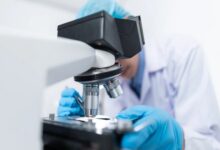Researchers may be able to modify HIV in cells, suggesting a treatment: Report
According to the BBC, researchers can use the potent CRISPR technology (Clustered Regularly Interspaced Short Palindromic Repeats) to eradicate HIV infection from cells. The 2020 Nobel Prize-winning gene-editing technique works at the molecular level (inside the cell) as genetic scissors, snipping DNA at specified locations to eliminate damaged or inactive sections.

The virus known as HIV (human immunodeficiency virus) targets the immune system of the body. It may result in AIDS (acquired immunodeficiency syndrome) if left untreated. As of right now, there is no proven treatment for HIV/AIDS.
The medications on the market today may halt the virus’s onslaught but not completely eradicate it.
This week at a medical symposium, a team from the University of Amsterdam presented their preliminary results. According to the BBC, they said that their research is in its early phases and that an HIV cure is not likely to occur anytime soon.
Dr. James Dixon, an associate professor of stem-cell and gene-therapy technologies at the University of Nottingham, responded to the findings by stating that much more research is still required.
“CRISPR technology is a promising approach that has been debated extensively for its potential to cut or deactivate the HIV genome. To show that outcomes from these cell assays may occur across the body for a potential therapeutic, much more work will be required to address the distribution of these systems, which is still a major problem, according to Dr. James Dixon, who spoke with Science Media Center.
Dr. Jonathan Stoye, a virus specialist, said that eliminating HIV from the body might be difficult since it is found in many cells.
“It is very difficult to eradicate HIV genomes from every cell that makes up the long-lived viral reservoirs in such individuals. Concerns about the treatment’s off-target effects and potential long-term negative effects still persist. Therefore, even if CRISPR-based treatment can be shown to be beneficial, it is probable that many years will pass before it is used routinely, Dr. Stoye also said to the Science Media Center.







